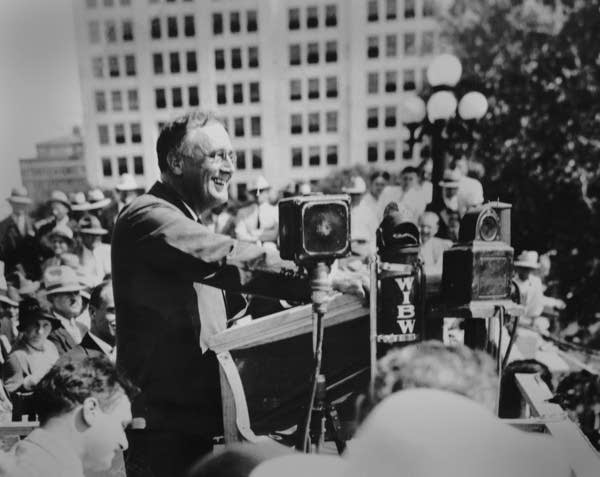Radio: FDR’s ‘Natural Gift’
President Franklin D. Roosevelt was a radio natural. He spoke in a confident, informal way, using simple words and phrases that were easy to grasp.

President Franklin D. Roosevelt was a radio natural. He spoke in a confident, informal way, using simple words and phrases that were easy to grasp. His Fireside Chats reached record-breaking audiences. He pioneered the modern, electronic political campaign. And with a nation gripped first by the Great Depression and then World War II, Roosevelt and his administration made extensive use of radio as a tool to educate and persuade the American people.
Earlier presidents had appeared on radio, but FDR is widely regarded as the first chief executive to master the medium as a source of political advantage. He set the standard for all to follow. FDR honed his radio voice as governor of New York from 1929 to 1933. To bypass the Republican-controlled legislature and the near-monopoly by Republicans on state newspapers, FDR broadcast a series of informal-sounding monthly chats to the people of New York. Eleanor Roosevelt (who made 300 radio appearances herself) said her husband came by his command of the microphone naturally. “His voice lent itself remarkably to the radio,” she wrote. “It was a natural gift, for in his whole life he never had a lesson in diction or public speaking.”
FDR’s administration understood and used the power of radio to sell the New Deal and, later, to mobilize Americans to oppose the Axis powers. The radio networks were willing accomplices. Radio came under increasing federal regulatory scrutiny in the 1930s, and network executives curried favor with the White House by providing free airtime for dozens of government-produced public service programs that promoted New Deal initiatives. During World War II, the networks offered up choice slots in their schedules for war bond rallies and home-front morale shows.
FDR appeared on the radio hundreds of times during his 12-year presidency. Broadcasts ranged from folksy events, such as the lighting of the White House Christmas tree or a salute to the Boy Scouts, to annual fundraising extravaganzas on FDR’s birthday, with the proceeds going to fight polio. FDR made canny use of the radio in election campaigns and political contests. He often saved his most fiery rhetoric for nationally broadcasts speeches to big public rallies.
FDR’s Fireside Chats were markedly different from his orations from a podium. The chats demonstrated his expertise before the radio microphone. The president modulated his voice to evoke a sense of friendly intimacy. It was just FDR and the American people, in what to many sounded like a one-to-one conversation. The term “fireside chat” was not invented by FDR or his administration, but by a CBS executive in a 1933 press release. The idea immediately caught on. Almost all of the broadcasts were made in the evening, and many of them on Sunday — radio’s prime time. The three major networks cleared their schedules for the live broadcasts. The peak audience for an FDR chat reached an estimated 70 percent of listeners. Some 800 radio stations carried the program, reaching tens of millions of people. A number of Roosevelt’s chats were also broadcast internationally and translated into foreign languages.
Many Americans listened to the speeches gathered around a radio in the living room. Some movie theaters would halt a screening and switch over to the broadcast so the audience could listen. When FDR finished, the movie resumed. Writer Saul Bellow recalled being able to walk along a Chicago boulevard and hear the president’s voice uninterrupted as he passed one car after another with the windows rolled down and the radio on.

FDR delivered some of the chats from the library of his Hudson River home in Hyde Park, New York. But most originated from the Diplomatic Reception Room on the first floor of the White House. The radio networks set up their microphones at a desk and their broadcasting gear at the back of the room. An invited audience of several dozen people sat in folding chairs. The president was wheeled in about 10 minutes before air time. He would josh with the radio crew and smoke a cigarette while arranging his script. The network announcers introduced FDR and, on cue, he would begin with his trademark line: “My friends…”
From across the map, Americans responded enthusiastically to the broadcasts. They praised FDR’s radio voice and manner. But however good a performer FDR was at the microphone, it was the clarity and simplicity of his words that drove home his message. FDR had an exceptional team of writers working for him, including Pulitzer Prize winners Robert Sherwood and Archibald MacLeish. FDR and his team might labor over one of his Fireside Chats through many drafts. FDR aide and speechwriter Samuel Rosenman remembered: “The preparation of some of the speeches or messages took as many as 10 days, and very few took less than three.”
FDR conserved his use of the chats for times of crisis or political urgency. Many average citizens wrote to him asking that he appear more often on the radio, even weekly. But Roosevelt held back. While he appeared hundreds of times on radio, it was most often while at some kind of event, such as dedicating a bridge, addressing a labor convention or campaigning for office. The Fireside Chats were different. Many years he gave only one. During the war years he spoke more frequently. FDR gave five chats in 1942, the first full year of the war.
Listeners to the Fireside Chats deluged the White House with letters and telegrams. FDR’s critics were legion, and many detested him with a passion. But millions of others wrote in to praise his policies and his radio manner. In 1933, a listener from California wrote: “Your voice radiates so much human sympathy and tenderness, and Oh, how the public does love that.”

